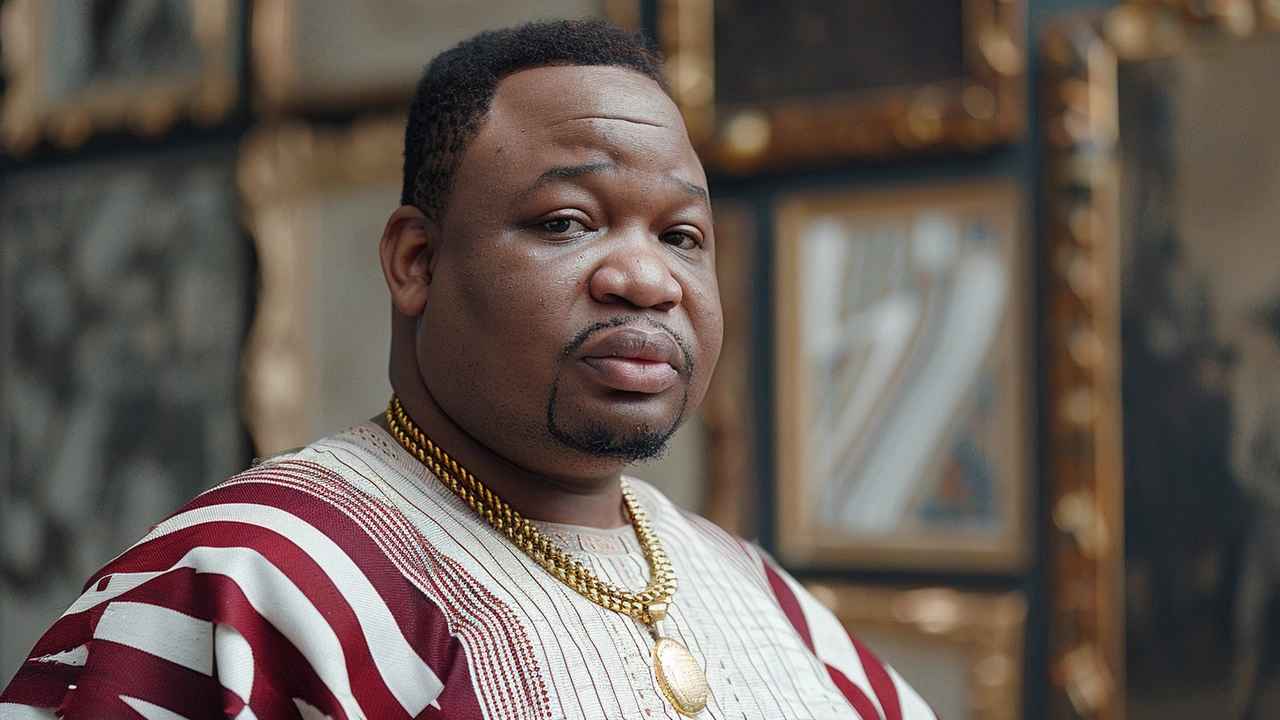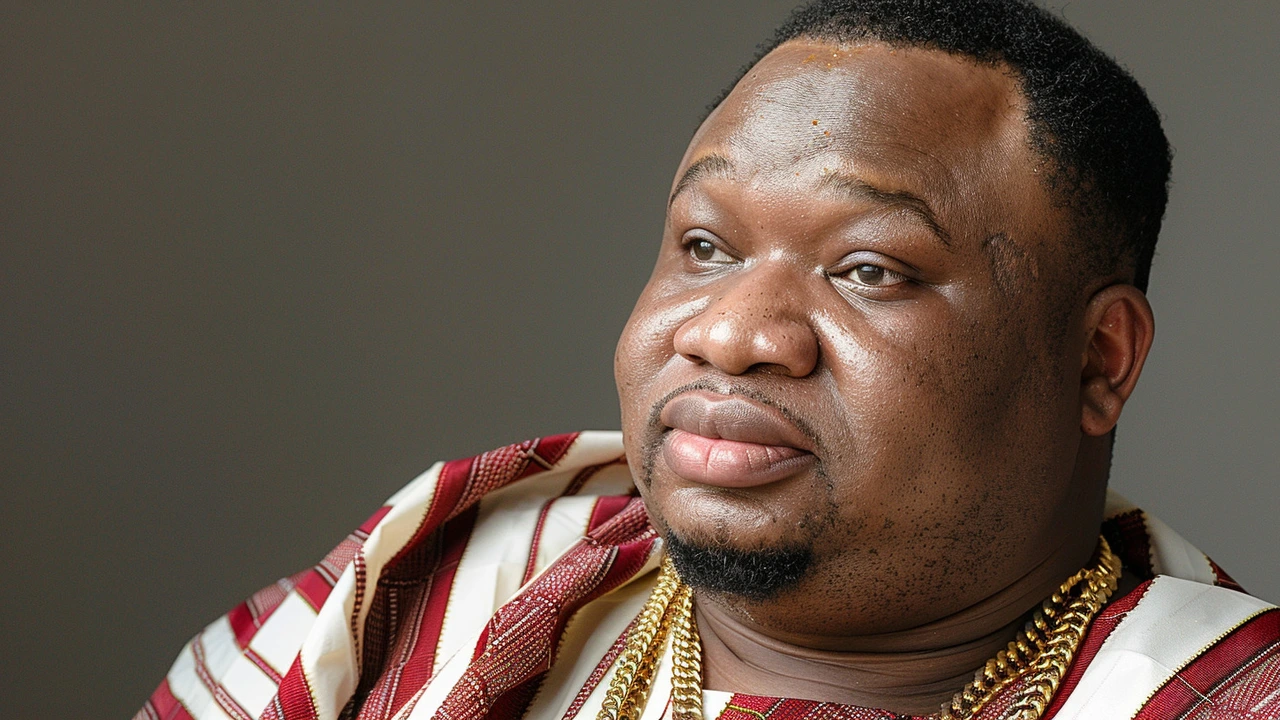25 Jun 2024
- 20 Comments
In a noteworthy turn of events, the Federal High Court in Lagos, presided over by Justice Kehinde Ogundare, has struck out the charge leveled against popular celebrity bartender Pascal Okechukwu, widely recognized as Cubana Chief Priest. The case had come into the limelight in April 2024, when the Economic and Financial Crimes Commission (EFCC) arraigned him on three counts related to the alleged abuse of the Nigerian Naira.
Cubana Chief Priest stood accused of tampering with and spraying Naira notes during a high-profile social event held at the upscale Eko hotel in Lagos. The charges posed significant challenges for Okechukwu, bringing his highly visible public persona under intense scrutiny. During his court appearance on April 17, he maintained his innocence and pleaded not guilty to all the charges. The court subsequently granted him bail, setting the sum at N10 million.
Settlement Reached
Fast forward to June 25, 2024, and the landscape of the case took a different direction. Mrs. Bilikisu Buhari, the prosecutor from the EFCC, announced that a settlement had been reached. The settlement terms had been diligently negotiated between the legal representatives of both parties. Mr. Chikaosolu Ojukwu (SAN), representing Cubana Chief Priest, concurred with the terms, paving the way for a resolution.
The agreement stipulated that Cubana Chief Priest would enter into a bond with the EFCC to demonstrate good behavior moving forward. Further adding to his responsibilities, he was required to embark on an extensive campaign aimed at sensitizing the public against the abuse of money. This campaign was outlined to include regular bi-monthly videos that he would share on his widely followed social media platforms. These videos are aimed at educating his followers about the legal and social implications of mishandling currency, a practice that is not uncommon at flamboyant social gatherings in the country.
Financial Penalty and Court Decision
Additionally, Cubana Chief Priest agreed to pay a sum of N10 million to the consolidated revenue fund of the Federation as part of the settlement. This considerable amount serves not only as a financial penalty but also as a public statement against the personalization and mishandling of the nation’s currency.
With the settlement in place, Justice Kehinde Ogundare acknowledged the motion to withdraw the preliminary objection initially filed by the defense. The court’s acceptance of the settlement terms led to the charges against Okechukwu being formally struck out.
In his final remarks, Justice Ogundare cautioned Cubana Chief Priest, urging him to adhere to the agreed terms and underlining the importance of upholding the integrity of the national currency. The court's decision to strike out the case reflects the broader judicial approach toward resolving such matters through settlements that underscore accountability and future compliance rather than merely punitive measures.

Cultural and Legal Implications
This case highlights a unique intersection between culture and law. Spraying money at social gatherings, while festive and seen by many as a display of wealth and goodwill, runs counter to the laws governing the use of the Naira. The Central Bank Act clearly outlines permissible and impermissible uses of currency, aiming to preserve its integrity and prevent practices that could diminish its value or lead to counterfeiting.
Cubana Chief Priest’s involvement in public sensitization campaigns could potentially shift public perception and discourage similar incidents in the future. His influence as a public figure offers a unique advantage in spreading awareness and fostering a culture of respect for the Naira.
Influence of Social Media
Given Okechukwu’s vast following on social media, his commitment to posting educational content on this issue is expected to reach a wide audience. Social media, with its rapid dissemination of information, presents a powerful platform for such campaigns. By sharing these videos regularly, Okechukwu leverages his platform for a cause that benefits both the public and the economy.
Moreover, this approach aligns with broader trends where influencers and public figures are increasingly being called upon to use their platforms responsibly. With significant followings come significant responsibilities, and this case sets a precedent for how such influence can be redirected towards positive social change.

Conclusion
The case against Cubana Chief Priest highlights critical aspects of law enforcement, judicial process, and the role of public figures in shaping societal behavior. The settlement agreement serves as a reminder of the importance of adhering to legal standards and the impact of educational campaigns in cultivating a mindful society. As Cubana Chief Priest embarks on this new role as an advocate for proper currency handling, his actions will undoubtedly be watched closely, serving as a barometer for the effectiveness of such judicial resolutions in driving positive outcomes.


Charlotte Hewitt
June 25, 2024They’re hiding the real reason behind the settlement.
Jane Vasquez
June 28, 2024Looks like the court just gave Cubana a free pass, and the media ate it up 😒. They’ll parade the N10 million fine like a badge of honor while pretending it’s a moral victory. The whole thing feels like a staged reality‑TV episode rather than a serious judicial effort. Imagine the headline: ‘Celebrity learns to behave, court smiles.’ It’s almost comedic how they turned a legal issue into a PR campaign.
Hartwell Moshier
July 1, 2024The fine seems huge but he can probably pay it.
Jay Bould
July 4, 2024I get why people see cash‑spraying as a status move, but in Nigeria it actually clashes with the Central Bank’s rules. The naira’s value is already under pressure, so tossing it around just adds insult to injury. By turning this into an educational push, the settlement could actually help change that mindset. Hopefully his videos will explain why preserving the currency matters, not just how to look flashy at parties.
Mike Malone
July 7, 2024The recent settlement involving Pascal Okechukwu, popularly known as Cubana Chief Priest, offers a fascinating case study of how Nigerian jurisprudence navigates the intersection of celebrity culture and statutory enforcement.
While the Federal High Court’s decision to strike out the charges may appear permissive at first glance, it actually reflects a nuanced balancing act between punitive deterrence and restorative justice.
The N10 million bond, alongside the mandated public education campaign, serves as a hybrid sanction that seeks to repair the symbolic damage inflicted upon the nation’s currency.
Spraying money at lavish events, a practice long embedded in certain social circles, undermines the Central Bank Act’s provisions that protect the integrity of legal tender.
Moreover, the act of dispersing banknotes en masse can inadvertently facilitate counterfeiting operations, a risk that regulators cannot ignore.
By compelling an influencer to produce bi‑monthly videos, the settlement leverages his extensive reach to transform a liability into an educational asset.
Such a strategy aligns with contemporary legal theory that emphasizes the corrective power of public shaming combined with constructive outreach.
From a constitutional perspective, the court’s willingness to accept a negotiated settlement respects the principle of proportionality in sentencing.
It also signals to other high‑profile individuals that the state is prepared to engage in dialogue rather than resorting immediately to harsh incarceration.
However, critics may argue that the absence of a criminal conviction dilutes the deterrent effect intended by anti‑money‑spraying statutes.
The broader societal implication is that cultural practices deemed frivolous may be co‑opted into formal legal discourse, prompting a reevaluation of long‑standing customs.
In the Nigerian context, where cash remains a dominant medium of exchange, the visual spectacle of money‑spraying can erode public confidence in the value of the naira.
The court’s admonition to uphold the integrity of the currency resonates with historical efforts to stabilize the economy during periods of inflationary pressure.
Looking forward, the effectiveness of Cubana’s campaign will likely be measured by a perceptible decline in similar flamboyant displays at future events.
Ultimately, this settlement may set a precedent for how the judiciary addresses white‑collar offenses committed by public figures, blending accountability with rehabilitation.
Pierce Smith
July 10, 2024Your analysis hits the nail on the head; the blend of punitive and restorative measures is exactly what we need in high‑profile cases. It’s rare to see the courts pull back from a straight‑jacket sentence and actually think about long‑term impact. I’d add that the public education component could double as a deterrent if executed well.
Abhishek Singh
July 13, 2024Great, another celebrity learns the hard way that money isn’t a costume.
hg gay
July 16, 2024Haha, this is wild 😂. The court basically gave him a chance to turn his fame into a teachable moment. I hope his videos actually get people thinking instead of just being another brag reel. If he pulls it off, maybe we’ll see fewer cash‑spray parties.
Owen Covach
July 19, 2024Money‑spraying is like fireworks for the rich but a nightmare for the economy. People think it’s cool until the Central Bank gets mad. Stop glorifying cheap thrills.
Pauline HERT
July 22, 2024Totally agree – the spectacle is overhyped and the fallout is real. It’s high time we stopped pretending it’s harmless fun.
Ron Rementilla
July 26, 2024The settlement feels like a compromise, but I’m skeptical about its actual enforcement.
Chand Shahzad
July 29, 2024Enforcement will be key; without monitoring his video output, the agreement might just be paper.
Eduardo Torres
August 1, 2024Let’s see if his followers actually listen.
Emanuel Hantig
August 4, 2024Interesting turn of events! 🎥 If he genuinely educates, it could set a new standard for influencer responsibility. Fingers crossed the videos are more than just hype.
Byron Marcos Gonzalez
August 7, 2024Ah, the saga of the flamboyant bartender continues. Who needs drama when you have legal theatrics? The court’s pen is mightier than the spray bottle, apparently. Let’s hope his next act is less about money and more about substance.
Chris Snyder
August 10, 2024From a legal perspective, the settlement provides a measurable benchmark: the number of videos produced and their content quality. If he meets the stipulated schedule, the enforcement agency can verify compliance, turning a symbolic fine into actionable outcomes.
Hugh Fitzpatrick
August 13, 2024Sure, because a few videos will magically stop everyone from tossing cash around.
george hernandez
August 16, 2024The whole episode reminds me of how pop culture can be harnessed for civic education, a concept that’s been explored in media studies for decades. When a figure like Cubana steps onto the platform of legal compliance, it creates a unique intersection where law meets entertainment. If his campaign balances authenticity with clear messaging, it could transcend the typical “talk‑show” vibe and actually shift public perception. On the flip side, the risk of it devolving into self‑promotion is high, especially given his branding acumen. Ultimately, the success of this initiative will be judged not by the number of views, but by measurable changes in how people treat the naira at social events.
bob wang
August 19, 2024Agreed – the metrics will tell the story 📊. If the view‑counts translate into fewer cash‑spray incidents, the court’s innovative approach will have proven its worth. Let’s just hope the videos stay on point and not become another vanity project. 🤞
Seyi Aina
August 22, 2024Honestly, this whole thing just shows how rich folks think they can buy their way out of anything.